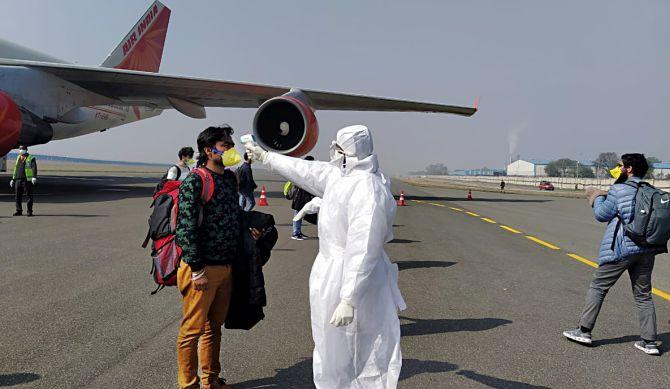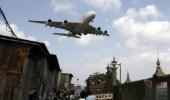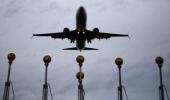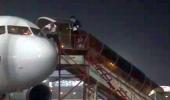‘The recent price hike would only be beneficial if the airlines continue to operate at 80 per cent airline capacity. An increase towards 90 or 100 per cent airline capacity would again add pressure to the fares as demand remains muted. Also, we are in the fourth quarter of the fiscal year which is a seasonally weaker quarter,’ says an analyst.

The revision in air fare price band by up to 30 per cent is a move optically in the right direction, analysts said, but will not benefit airlines much amid steadily rising oil prices. The proposal, they believe, will make a meaningful impact only if the capacity remains capped amid plateaued passenger growth.
On Thursday, the ministry of civil aviation revised the fare price band on flights with 90 to 120 minutes of duration to Rs 3,900, up from Rs 3,500 earlier. The cap on maximum chargeable fare has been raised to Rs 13,000 from Rs 10,000.
However, the cap on airline capacity, currently at 80 per cent of the pre-Covid level, has been extended till March 31.
“The recent price hike would only be beneficial if the airlines continue to operate at 80 per cent airline capacity. An increase towards 90 or 100 per cent airline capacity would again add pressure to the fares as demand remains muted. Also, we are in the fourth quarter of the fiscal year which is a seasonally weaker quarter,” says an analyst at a domestic brokerage who didn’t wish to be identified.
ICICI Securities, in a report dated February 12, noted that the hike in lower and upper fare caps while keeping the capacity limit of 80 per cent can be a near-term support considering the overall fare weakness.
“But, it also points to the excess supply-demand mismatch even within the operational capacity. With international travel likely to remain suspended, complete capacity utilisation of Indian airlines may have to wait for some time,” it said.
SpiceJet is currently operating at 72 per cent of pre-Covid schedule, and IndiGo is aiming to operate at 75-80 per cent capacity of Q4FY20. The erstwhile international capacity (nearly 25 per cent mix for IndiGo/SpiceJet), however, remains grounded.
“We understand this extension of floor and caps has happened on the back of lobbying by smaller/weaker airlines so as to prevent IndiGo from taking its capacity deployment to 100 per cent and taking more market share as there is the concern of pressure on fares due to further capacity deployment,” says Ashish Shah, research analyst tracking the sector at Centrum Broking.
Cost and revenue conundrum
Weekly average daily fliers stood at 2.48 lakh in the week ended February 6 compared with 2.42 lakh fliers for the week ended January 30. Moreover, the average number of departures per day increased only marginally to 2,215 in the week ended Feb 6 vis-à-vis 2,211 in the week ended Jan 30. Amid this, a hike in air fare may dent traffic revival further, fear analysts.
“Considering that the majority of traffic continues to be of visiting friends or relatives (VFR) category, where price elasticity is relatively high compared to corporate traffic, the fare hike could also lead to lower demand. As alternate travel modes become more viable with the mitigation of Covid impact, airfare hikes can reroute some marginal travellers back to road/rail. Government support could have been more effective through ATF tax cut, albeit provisional,” said analysts at ICICI Securities in a report.
India had fixed a cap on air fares in May 2020 when Brent crude oil was hovering around $29 per barrel mark. This has, however, moved up to $60 per barrel mark in February 2021, a jump of 107 per cent. In comparison, the hike in air fares is up to 30 per cent which, analysts say, will only partially off-set the increased input costs.
Investment strategy
Analysts remain divided on how to approach the listed players in this sector. While some suggest most positives are priced-in and the recent hike in air fare may not significantly impact the earnings, others still remain bullish from a long-term perspective.
G Chokkalingam, founder and chief investment officer at Equinomics Research, notes that the pandemic has shrunk balance sheets of airlines with debt levels rising gradually. Moreover, oil prices, he says, may move higher going ahead and recommends investors cash out, especially in IndiGo.
That said, Shah of Centrum Broking maintains ‘Add’ on IndiGo as he believes that even as this extension of capacity cap disrupts IndiGo’s plans of reaching 100 per cent of domestic capacity deployment by March, it provides support to overall fare levels in the industry.
“The bankruptcy risk of any airline is already past its peak as we gradually recover from Covid-19. Hence, if we believe no airline is going out, the benefit from this hike will be equally applicable to IndiGo,” says ICICI Securities.
Shares of aviation firms InterGlobe Aviation and SpiceJet took off at the bourses on Friday, cheering the government's decision. In the intra-day trade, IndiGo shares jumped up to 4.7 per cent on the BSE to hit an intra-day high of Rs 1,704 apiece while those of SpiceJet soared 7 per cent to a high of Rs 94 per share. At close, IndiGo stock up 0.8 per cent at Rs 1,641 apiece, while SpiceJet ended 3 per cent higher at Rs 91 per share.












 © 2025
© 2025